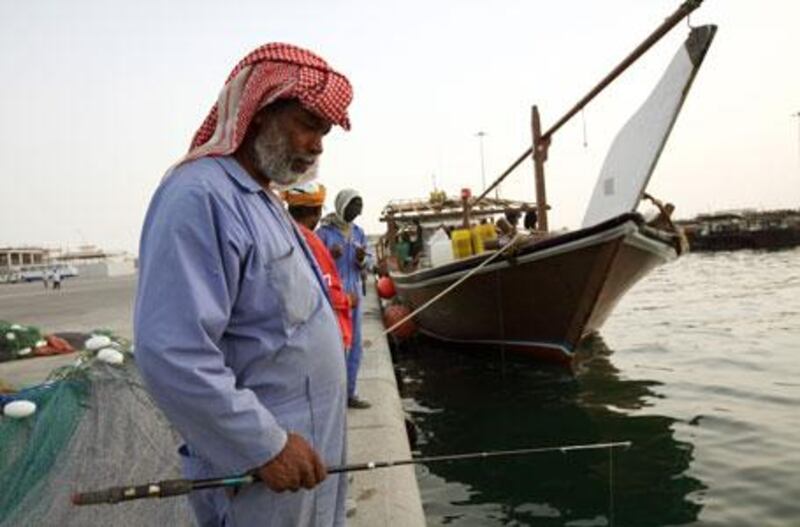AL KHOR, QATAR // The scores of dhows in the harbour are reminiscent of the Gulf before it was transformed by oil and gas. Fishing nets are spread out on the quayside as sailors from Nepal and India chat and laugh on board their vessels. While there have been some changes - the dhows are fibreglass instead of wood and Al Khor used to be known for pearling rather than fishing - the city retains a tranquil character at odds with the transformation of Doha, 50km to the south.
This serenity of this city, which is older than Doha, could, however, become a thing of the past. The nation's second-largest building project is expected to more than double the population with a wave of residential, hotel and marina schemes, scheduled for completion in 2012 or 2013. Barwa Al Khor will build accommodation for 63,000 people, about one-and-a-half times the city's population. Town houses, chalets, villas and even an 18-hole golf course are included in the 35 billion riyal (Dh35.3bn) project.
Syed Ahmed, a senior engineer for Barwa Al Khor, a subsidiary of the developer Barwa Real Estate, said the government was "keen" to see the city developed following the growth of the gas industry in the nearby industrial city of Ras Laffan. Currently, many who work in Ras Laffan commute from Doha, a distance of 80km, but the development of Al Khor will provide more accommodation nearby. The gas industry boom has already affected Al Khor, with thousands of expatriates, mostly gas workers and their families, having moved into the Al Khor community residential development on the city's outskirts.
Such developments have led to more enrolments in local schools, said Bill Turner, deputy principal and head of secondary division at Al Khor International School. In September 2005, there were 320 pupils at the school, but today the figure is double that and by the end of next year it is expected to reach 800. About one-third of the pupils are Indonesian, the nationality of many of those in the gas industry.
"Everything is changing so fast here," Mr Turner said, adding that the relaxed character of the city was being lost as a result. "It was sleepy, hot, low key and quiet, and now in the last two years it's got McDonald's and Hardee's - a lot of fast-food restaurants are springing up. Costs are going up too." In the port, for example, berthing a boat used to be free, but now leisure sailors need to have permits and give notice of their movements, he said. Similarly, many beaches that were open to the public are now fenced off.
"It's as though the people are realising their little bit of land is worth something. It's inevitable really. In five years' time it will be completely different. The key thing is that it holds on to the good things of the past." Building work is due to begin within a year, although Mr Ahmed said the global economic recession was likely to delay completion. "We're planning for the infrastructure to be completed in 2012 or 2013 but let's see because of the financial crisis.
Maybe it will delay it by one or one-and-a-half years." Some of the concerns about further development are environmental. Residents report that some homeowners have already cut away mangroves outside their properties, and they fear this could increase as development accelerates. Mr Ahmed from Barwa Al Khor insisted, however, the project would not have much of a further impact. "It's not big losses of the mangroves. We're not removing the main mangrove areas because in our areas the density is not too high. Where it's dense, we won't touch it."
Al Khor's Qatari residents are unfazed by the transformation. They welcome the development so far and are keen for more. "It's a good thing because there will be many tourists coming in the city," said Adel al Emadi, 29, a government employee. "In my city it's already better than before with new buildings and new malls." According to Saad al Misand, 28, another Al Khor resident, the city lacks top-end facilities, and he hopes the new developments will change this.
"There aren't good hotels now, so these new hotels will be a benefit for us. "There will be apartments as well. Al Khor is poor for this. There are not a lot of apartments." Abdulla al Mohannadi, 31, a security team leader, said he too expected more tourists to arrive as a result of the developments. "In the future I think it's good." Steven Wright, assistant professor in Gulf politics at Qatar University, believes many of Al Khor's traditional characteristics, including its thriving fishing industry, will survive.
"There is ample demand for locally caught produce. Probably demand will increase." dbardsley@thenational.ae Next week, The National visits a village outside the capital where Qataris are clinging to their traditions as change happens around them.





